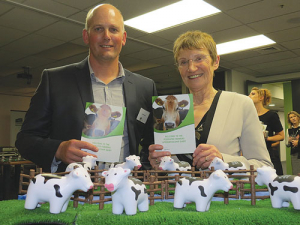The dairy industry has launched an ambitious scheme to encourage young New Zealanders to make careers on farms.
Spearheaded by Federated Farmers and the Primary ITO, with support from DairyNZ, iwi entities, dairy companies and others, the scheme will provide for dairy farming apprenticeships open only to New Zealanders.
The scheme is designed to achieve better working conditions than many young trainees have endured in the past, and to provide structured training and mentoring leading to a good qualification and excellent prospects.
A pilot programme launched online last week had within hours attracted expressions of interest from dozens of young people.
According to the head of Federated Farmers dairy section, Chris Lewis, the Dairy Apprenticeship Scheme is similar in many ways to the dairy farm cadet scheme that launched his dairy farming career 25 years ago.
He and others recalled similar experience and began discussions with the Primary ITO; so the new dairy apprenticeship scheme was conceived, Lewis says.
“When I went farming 25 years ago I lived in an outside room beside the boss’s house and I was very lucky that my boss’s wife was an ex chef so I was fed well and got other help. I was living with a family and being mentored by the farmer and eating breakfast, lunch and dinner with them.”
Lewis says a key to the success of the scheme will be a series of documents, including a charter, produced by Federated Farmers with DairyNZ which set out obligations for both employees and employers.
“It’s about getting better employment conditions onfarm and so the farm charter is recognising that the employer has a big part to play in the future success of the employee,” he says.
The guarantees in the charter and apprenticeship documents are intended to assure parents of youngsters considering the scheme that they will be well cared for and treated properly. He says in his own case the guarantees in the cadet scheme 25 years ago helped him get his parents’ support for his start in the industry.
The scheme is in response to calls to get more ‘Kiwi kids’ into farming and hire fewer migrant workers, Lewis says.
“The minister of immigration has said to us many times that you can’t keep relying on immigrants to fill the roles and so this is aimed at a local pool of Kiwi talent and making sure they are looked after and well trained and then, if need be, filling the gaps with migrants,” he says.
Lewis says the scheme will show the public that farmers are serious about treating staff well and will help them retain their social licence to farm.
And he says while young people today don’t expect to find a McDonalds or Burger King outlet in the middle of rural NZ, they do want to keep in touch with their friends via social media, hence the importance of fast rural broadband for recruiting youngsters.











